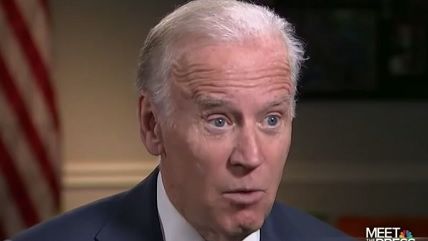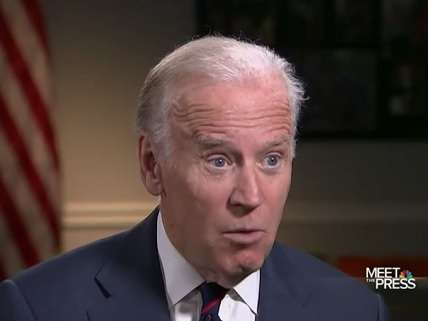Chuck Todd Asks Joe Biden: Why Is There Not a No-Fly Zone Over Aleppo?


In an interview with Vice President Joe Biden on Meet the Press, Chuck Todd continued the tradition of journalists shamelessly asking questions that incorporate their own worldviews and political preferences into the questions themselves.
"Why is there not a no-fly zone over Aleppo?" Todd asked in an exasperated tone of the situation in Syria. There's a long answer to that and a short one. The long one involves, among other things, the misconceptions people have about the effectiveness of no-fly zones, the lack of a clear strategic U.S. interest, disagreement about the facts on the ground in Syria and the difficulty of imposing a no-fly zone there specifically. The short answer is Russia operates in Syria, increasing the risk of conflict escalation significantly.
Much of the media and political class, however, worked up into a frenzy over Donald Trump and his supposed connections with Russia and Russia's alleged attempts to interfere in the U.S. election, have chosen to ignore Russia as a complicating factor in Syria. When Hillary Clinton callously suggested a no-fly zone, which she had previously admitted would inevitably lead to civilian casualties, could be used to create leverage that could force Russia to the negotiating table over Syria, no one asked her what the purpose of forcing Russia to the negotiating table would be.
The U.S. government's only clear goal in Syria is the removal of Bashar Assad. While President Obama acknowledged failing to plan for the aftermath of the intervention in Libya was the greatest mistake of his presidency, no one seems particularly concerned that Clinton (who was secretary of state during the Libya war) has not explained what the plan for a post-Assad Syria is. That so-called moderate rebels are in danger of joining extreme groups absent U.S. support suggests there are no substantive moderate forces in Syria, let alone ones the U.S. could with any kind of confidence support as a new Syrian government. Even if there were, the strategic benefits to the U.S. of toppling Assad are murky at best.
For his part, Biden responded to Todd's question by insisting the U.S. had to defeat ISIS first. "We could not do both." Biden also blamed Republicans for not giving the Obama administration the authority to use force in Syria. "All those Republicans talk about how tough they were," Biden insisted, blatantly tapping into the machismo conceits of U.S. interventionism, before revealing that those Republicans had a point. "They'd say, 'What happens, we send planes over there, they get shot down? We have to go in and get 'em'," Biden explained. "Well, yeah, we have to go in and get 'em."
Todd pressed on with the leading questions: "How does Syria not become the Rwanda of this administration? That you guys look back and wonder what if? What if? What if? What if?" The comparison itself is ridiculous and reveals a shallow understanding of the 1994 conflict in Rwanda, the current conflict in Syria, or both. "Rwanda was soluble," Biden insisted. "This is complicated."
Todd continued: "So we're not gonna regret not doing more in Aleppo?" Biden's response was that the administration regretted whenever anyone dies. "I regret that we're not doing something about, you know, genital mutilation in Africa. I regret there's still real problems in Afghanistan," Biden said, without explaining what he had in mind about what could or should be done in those areas. "But there has to be a sense of humility about what is able to be done at the time. And what we're doing is the right thing. Generating a consensus among the Arab countries as to what we should be doing in the region. And at the same time, going after ISIL [ISIS] to destroy it."
Trump and Clinton both broadly agree with the Obama administration's anti-ISIS strategy as summarized by Biden. Trump says he will be tougher but doesn't specify how (except to say he would not announce U.S. operations) while Clinton has also insisted on a no-fly zone and taking a more provocative stance vis a vis Russia, with which the Obama administration has tried to some degree to come to an understanding over Syria.
Watch the entire Todd-Biden interview here.


Show Comments (64)